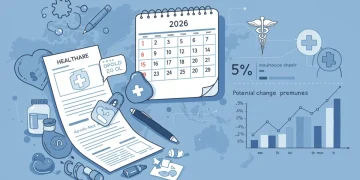Health tech advancements trends transforming healthcare

Health tech advancements like artificial intelligence, telehealth, and wearable devices are revolutionizing patient care by improving diagnostics, enhancing treatment personalization, and providing convenient access to medical services.
Health tech advancements trends are reshaping the landscape of healthcare, offering innovative ways to improve our well-being. Have you ever wondered how these technologies can enhance your health experience? Let’s dive in and explore these changes together!
Emerging technologies in health tech
Emerging technologies in health tech are reshaping the way we approach medical care. These advancements are not just innovative; they have the power to enhance patient outcomes significantly.
Key Innovations in Health Tech
From artificial intelligence to blockchain, several technologies are making waves in the healthcare industry.
- Artificial Intelligence: AI algorithms help in diagnosing diseases more accurately.
- Telemedicine: Patients can now consult doctors from the comfort of their homes.
- Wearable Devices: Track health metrics in real-time, empowering users to manage their health better.
- Data Analytics: Analyzing vast amounts of data aids in personalized medicine.
As these technologies continue to evolve, they promise to provide solutions that are both effective and accessible. For instance, imaginative uses of virtual reality are being explored in rehabilitation therapies, enhancing recovery processes through immersive experiences.
Blockchain in Healthcare
Another promising area is blockchain, which offers increased security and privacy for patient records. By ensuring that data is tamper-proof, it enhances trust in how patient information is handled.
Integration of these emerging technologies is essential. Partnerships between tech companies and healthcare providers foster an environment ripe for innovation. As the demand for quality patient care rises, leveraging these advancements will be key.
Understanding and adapting to these changes can lead healthcare professionals to better serve their patients. Embracing such technologies not only improves efficiency but also promotes a proactive approach to health.
Telehealth’s rise and its impact

Telehealth’s rise is changing how healthcare is delivered and accessed. With just a few clicks, patients can connect with healthcare providers from the comfort of their homes.
The Growth of Telehealth
This technology has become especially crucial during recent global events, proving to be an effective solution during times of crisis. Patients are increasingly utilizing video consultations and virtual visits, leading to a surge in popularity.
- Convenience: Patients save time and travel expenses.
- Accessibility: Individuals in remote areas can receive care.
- Increased Safety: Reduces the risk of spreading infections.
- Improved Follow-Up: Easy scheduling for follow-up appointments.
The convenience of virtual healthcare means more individuals are seeking help. It has also opened doors for specialists to reach patients they wouldn’t have previously, creating a broader patient base.
Impact on Patient Care
Telehealth allows for quicker access to medical professionals, which is vital in urgent situations. Many patients with chronic conditions can monitor their health regularly through remote tools. This access encourages ongoing communication with doctors, leading to better health management and outcomes.
As technology continues to evolve, telehealth will likely include even more features such as artificial intelligence and improved data analytics for personalized care. Patients will soon be able to engage in their health journeys more actively, thereby increasing their involvement in treatment plans.
To capitalize on this rise, healthcare providers must adapt to these changes. Embracing telehealth is no longer optional but a necessity in modern medicine. It will transform patient engagement and satisfaction significantly.
Wearable devices revolutionizing patient monitoring
Wearable devices are revolutionizing patient monitoring and changing how we interact with our health. These gadgets allow users to track vital information anytime, anywhere, making health data more accessible than ever.
The Importance of Wearable Devices
Devices like smartwatches and fitness trackers are equipped with advanced sensors that monitor heart rates, activity levels, and sleep patterns. They have become essential tools for both patients and healthcare providers.
- Real-Time Data: Continuous monitoring provides immediate access to health metrics.
- Empowerment: Users can take charge of their health by tracking their progress.
- Preventative Care: Early detection of health issues allows for timely interventions.
- Enhanced Communication: Data can be shared directly with healthcare professionals, improving care.
These devices encourage individuals to live healthier lives. By offering insights into daily habits, wearables promote a more proactive approach to health management. Imagine exercising and receiving alerts on your heart rate; this immediate feedback helps you adjust your activities accordingly.
Future Trends in Wearable Technology
The future of wearable devices promises even more exciting advancements. Integration with artificial intelligence could personalize health recommendations based on collected data. Additionally, we may see improved battery life and enhanced features that further expand what these devices can monitor.
As technology evolves, these devices will likely play a crucial role in managing chronic conditions and improving overall health outcomes. By facilitating constant engagement, wearables empower patients and allow them to have an active role in their health journey.
Artificial intelligence in diagnostics and treatment

Artificial intelligence (AI) is making significant strides in diagnostics and treatment, transforming how healthcare professionals approach patient care. By leveraging large volumes of data, AI enhances the accuracy and efficiency of medical decisions.
The Role of AI in Diagnostics
AI technologies analyze medical images, lab results, and patient histories. This capability enables quicker diagnoses and can help detect conditions that may go unnoticed by human eyes. For example, AI algorithms can identify early signs of diseases such as cancer through image analysis.
- Faster Results: AI can process information quickly, allowing for quicker diagnostic conclusions.
- Increased Accuracy: Reducing human error leads to more precise diagnoses.
- Predictive Analytics: AI can forecast health risks based on patient data, guiding preventive measures.
- Scalability: AI systems can handle vast amounts of data from multiple sources efficiently.
This technology not only enhances diagnostic capabilities but also eases the workload on healthcare professionals. With AI handling routine tasks, doctors can focus on patient care and complex decision-making, improving overall health outcomes.
AI in Treatment Plans
In addition to diagnostics, AI plays a vital role in developing personalized treatment plans. By analyzing a patient’s genetic information and treatment responses, AI can suggest tailored therapies that are more likely to succeed.
Furthermore, AI systems can monitor patient responses to treatments, adjusting protocols in real time for optimal outcomes. This dynamic approach fosters a more responsive healthcare environment, ensuring that patients receive the best possible care.
The integration of AI in healthcare is set to redefine patient interactions and streamline processes. By improving both diagnostics and treatment strategies, it empowers healthcare providers to offer enhanced, data-driven care to their patients.
FAQ – Frequently Asked Questions about Health Tech Advancements
How does artificial intelligence improve diagnostics in healthcare?
Artificial intelligence analyzes medical data quickly and accurately, leading to faster and more precise diagnoses.
What are the benefits of telehealth for patients?
Telehealth provides convenience, allowing patients to consult healthcare providers from home, saving time and travel costs.
How do wearable devices enhance health management?
Wearable devices track real-time health metrics, empowering users to monitor their health and make informed decisions.
What role does AI play in developing treatment plans?
AI personalizes treatment plans by analyzing patient data, ensuring that therapies are tailored to individual needs.





